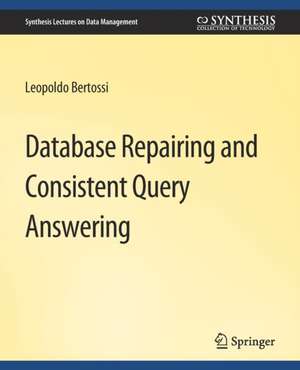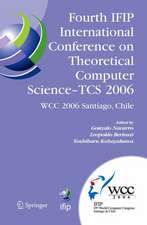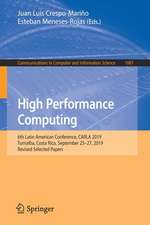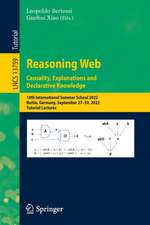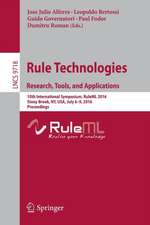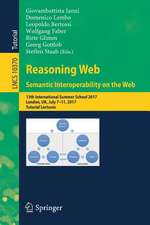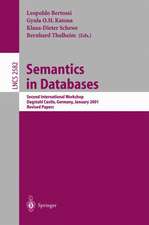Database Repairing and Consistent Query Answering: Synthesis Lectures on Data Management
Autor Leopoldo Bertossien Limba Engleză Paperback – 22 aug 2011
Din seria Synthesis Lectures on Data Management
- 20%
 Preț: 272.81 lei
Preț: 272.81 lei - 20%
 Preț: 304.44 lei
Preț: 304.44 lei - 20%
 Preț: 280.92 lei
Preț: 280.92 lei - 20%
 Preț: 239.45 lei
Preț: 239.45 lei - 20%
 Preț: 386.49 lei
Preț: 386.49 lei - 20%
 Preț: 165.44 lei
Preț: 165.44 lei - 20%
 Preț: 136.14 lei
Preț: 136.14 lei - 20%
 Preț: 329.44 lei
Preț: 329.44 lei - 20%
 Preț: 224.65 lei
Preț: 224.65 lei - 20%
 Preț: 225.48 lei
Preț: 225.48 lei - 20%
 Preț: 179.95 lei
Preț: 179.95 lei - 20%
 Preț: 355.90 lei
Preț: 355.90 lei - 20%
 Preț: 223.34 lei
Preț: 223.34 lei - 20%
 Preț: 165.44 lei
Preț: 165.44 lei - 20%
 Preț: 166.75 lei
Preț: 166.75 lei - 20%
 Preț: 330.56 lei
Preț: 330.56 lei - 20%
 Preț: 356.73 lei
Preț: 356.73 lei - 20%
 Preț: 224.00 lei
Preț: 224.00 lei - 20%
 Preț: 387.47 lei
Preț: 387.47 lei - 20%
 Preț: 226.14 lei
Preț: 226.14 lei - 20%
 Preț: 223.34 lei
Preț: 223.34 lei - 20%
 Preț: 230.28 lei
Preț: 230.28 lei - 20%
 Preț: 387.47 lei
Preț: 387.47 lei - 20%
 Preț: 177.29 lei
Preț: 177.29 lei - 20%
 Preț: 165.44 lei
Preț: 165.44 lei - 20%
 Preț: 224.97 lei
Preț: 224.97 lei - 20%
 Preț: 164.91 lei
Preț: 164.91 lei - 20%
 Preț: 226.14 lei
Preț: 226.14 lei - 20%
 Preț: 227.81 lei
Preț: 227.81 lei - 20%
 Preț: 227.62 lei
Preț: 227.62 lei - 20%
 Preț: 223.34 lei
Preț: 223.34 lei - 20%
 Preț: 227.62 lei
Preț: 227.62 lei - 20%
 Preț: 222.50 lei
Preț: 222.50 lei - 20%
 Preț: 385.71 lei
Preț: 385.71 lei - 20%
 Preț: 353.93 lei
Preț: 353.93 lei - 20%
 Preț: 227.29 lei
Preț: 227.29 lei - 20%
 Preț: 226.97 lei
Preț: 226.97 lei - 20%
 Preț: 330.10 lei
Preț: 330.10 lei - 20%
 Preț: 357.71 lei
Preț: 357.71 lei - 20%
 Preț: 245.51 lei
Preț: 245.51 lei - 20%
 Preț: 419.58 lei
Preț: 419.58 lei - 20%
 Preț: 224.65 lei
Preț: 224.65 lei - 20%
 Preț: 223.34 lei
Preț: 223.34 lei - 20%
 Preț: 225.67 lei
Preț: 225.67 lei - 20%
 Preț: 270.51 lei
Preț: 270.51 lei - 20%
 Preț: 224.97 lei
Preț: 224.97 lei - 20%
 Preț: 166.75 lei
Preț: 166.75 lei
Preț: 224.50 lei
Preț vechi: 280.62 lei
-20% Nou
Puncte Express: 337
Preț estimativ în valută:
42.96€ • 46.65$ • 36.09£
42.96€ • 46.65$ • 36.09£
Carte tipărită la comandă
Livrare economică 22 aprilie-06 mai
Preluare comenzi: 021 569.72.76
Specificații
ISBN-13: 9783031007552
ISBN-10: 3031007557
Ilustrații: XV, 105 p.
Dimensiuni: 191 x 235 mm
Greutate: 0.23 kg
Editura: Springer International Publishing
Colecția Springer
Seria Synthesis Lectures on Data Management
Locul publicării:Cham, Switzerland
ISBN-10: 3031007557
Ilustrații: XV, 105 p.
Dimensiuni: 191 x 235 mm
Greutate: 0.23 kg
Editura: Springer International Publishing
Colecția Springer
Seria Synthesis Lectures on Data Management
Locul publicării:Cham, Switzerland
Cuprins
Introduction.- The Notions of Repair and Consistent Answer.- Tractable CQA and Query Rewriting.- Logically Specifying Repairs.- Decision Problems in CQA: Complexity and Algorithms.- Repairs and Data Cleaning.
Notă biografică
Leopoldo Bertossi has been Full Professor at the School of Computer Science, Carleton University (Ottawa, Canada) since 2001. He is Faculty Fellow of the IBM Center for Advanced Studies. He obtained a Ph.D. in Mathematics from the Pontifical Catholic University of Chile (PUC) in 1988. He has been the theme leader for “Adaptive Data Quality and Data Cleaning" of the “NSERC Strategic Network for Data Management for Business Intelligence" (BIN), an ongoing umbrella research project that involves more than 15 academic researchers across Canada plus several industrial partners. Until 2001 he was professor and departmental chair (1993–1995) at the Department of Computer Science, PUC, and was also the President of the Chilean Computer Science Society (SCCC) in 1996 and 1999–2000. He has been visiting professor at the computer science departments of the universities of Toronto (1989/90), Wisconsin-Milwaukee (1990/91), Marseille-Luminy (1997) and visiting re[1]searcher at the Technical University Berlin (1997/98), visiting researcher and professor at the Free University of Bolzano-Bozen (Italy). In 2006, he was a visiting researcher at the Technical University of Vienna as a Pauli Fellow of the “Wolfgang Pauli Institute (WPI) Vienna". Prof. Bertossi’s research interests include database theory, data integration, peer data management, semantic web, intelligent information systems, data quality for business intelligence, knowledge representation, logic programming, and computational logic.
